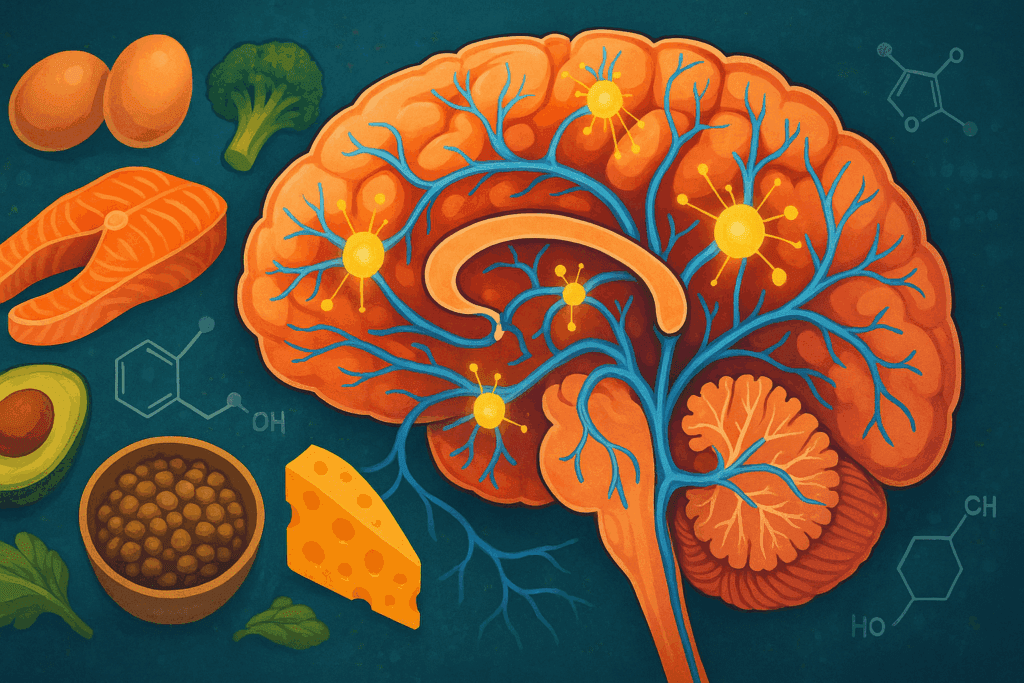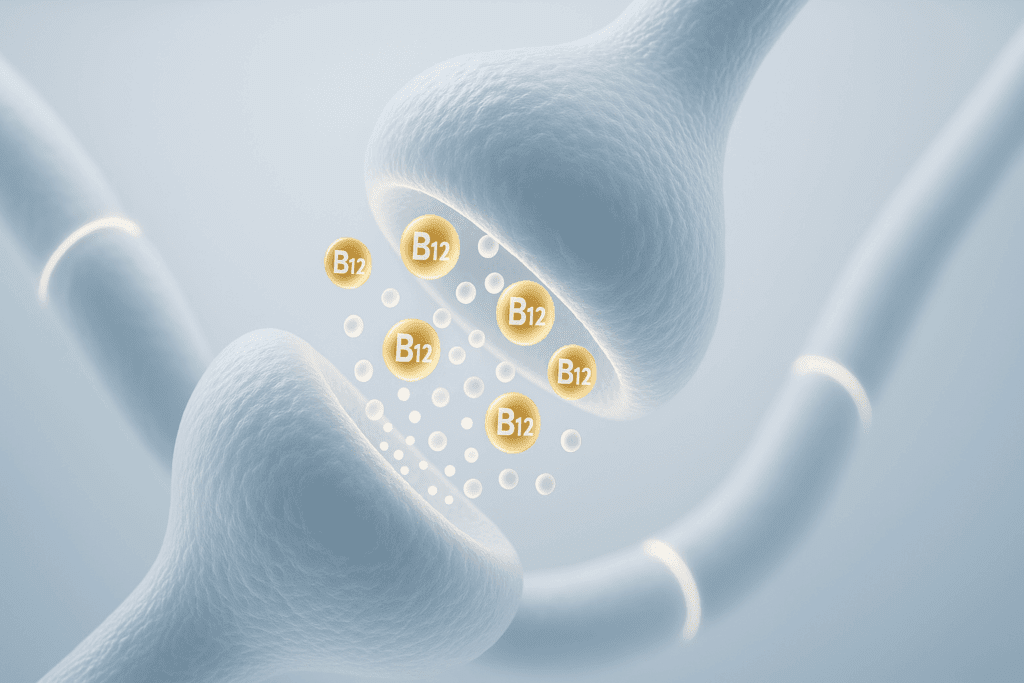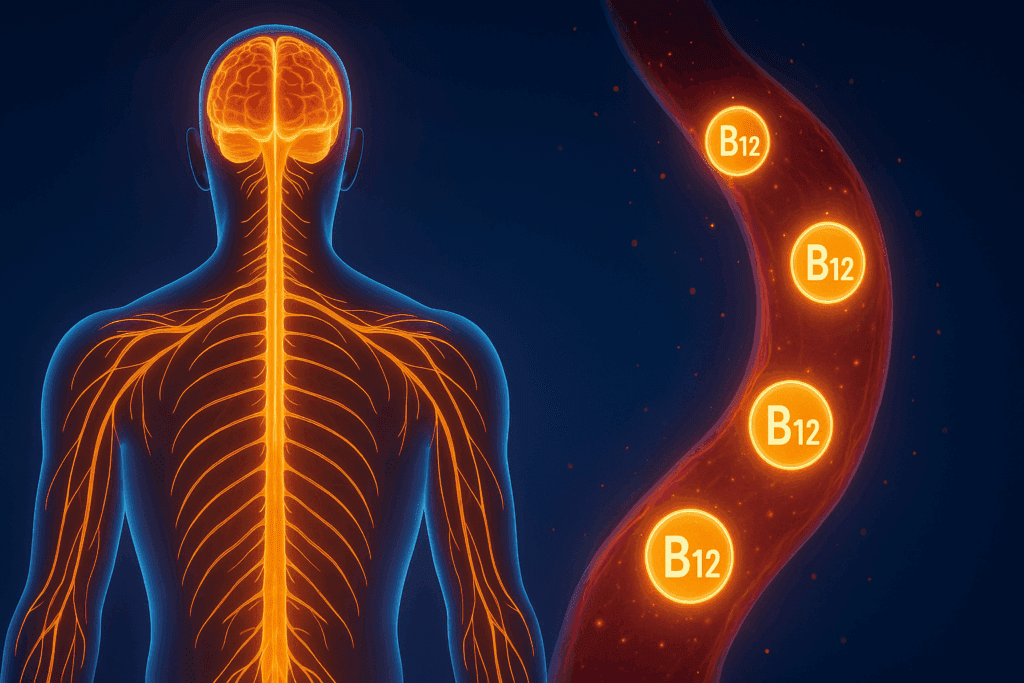In the realm of cognitive health and neuroscience, few questions recur as often as, “Does vitamin B12 help with memory?” As concerns about memory decline and cognitive fog become increasingly common across age groups, the spotlight on essential nutrients like vitamin B12 intensifies. Vitamin B12, a vital water-soluble nutrient, plays a key role in many neurological and cognitive processes, making it a prime candidate for research into memory preservation and enhancement. For individuals interested in optimizing brain health, especially in high-stress environments such as studying for exams or high-performance careers, understanding the role of this vitamin becomes not just useful, but essential.
You may also like: Best Herb for ADHD Support: How Natural Remedies and Herbs for ADHD Women May Help Boost Focus and Calm
Understanding the Brain-Vitamin Connection
The brain is among the most metabolically active organs in the human body, demanding a constant and rich supply of nutrients to function at its peak. Vitamin B12, also known as cobalamin, is crucial for the synthesis of DNA, the maintenance of healthy nerve cells, and the production of neurotransmitters like serotonin and dopamine. A deficiency in vitamin B12 can lead to a host of neurological symptoms, ranging from numbness and tingling to severe cognitive decline and memory loss.
Memory vitamin deficiency is a real concern, particularly in older adults, vegetarians, and those with gastrointestinal disorders that impair nutrient absorption. Scientific studies have repeatedly shown that vitamin B12 for memory support is particularly critical in populations at risk. In clinical settings, low levels of B12 have been associated with symptoms that mirror dementia, and in some cases, reversing the deficiency has led to noticeable cognitive improvements.

Does B12 Help with Memory: What the Research Reveals
Extensive clinical studies have investigated whether vitamin B12 helps with memory, especially in relation to conditions like Alzheimer’s disease, age-related cognitive decline, and brain fog. While results can be nuanced, a significant number of studies support the notion that maintaining adequate B12 levels is associated with better memory function. One of the key mechanisms by which vitamin B12 supports cognition is through its role in reducing homocysteine levels, an amino acid linked to brain atrophy and cognitive impairment when present in high concentrations.
In randomized clinical trials, individuals who received vitamin B12 supplementation showed improved memory performance compared to those who did not, especially when they had low baseline levels of the nutrient. This evidence suggests that vitamin B12 is good for memory, particularly in those who are deficient or on the borderline of deficiency. The role of vitamin B12 in memory is therefore not just speculative; it is supported by biological plausibility and a growing body of empirical research.
Vitamin B12 and Neurotransmitter Function
An important aspect of how vitamin B12 supports brain health lies in its influence on neurotransmitter synthesis. Neurotransmitters are the chemical messengers that allow neurons to communicate efficiently, influencing everything from mood to memory consolidation. Vitamin B12 contributes to the synthesis of myelin, the protective sheath that surrounds nerves and enhances signal transmission.
When myelin is compromised due to a B12 deficiency, nerve signals slow down, leading to cognitive symptoms including forgetfulness and difficulty concentrating. Therefore, maintaining adequate levels of vitamin B12 can help sustain optimal neurotransmitter activity, ultimately supporting learning and memory retention. This becomes especially relevant when considering how to remember things while studying or how to memorize something for a test. A well-supported nervous system is fundamental to employing effective memory methods for studying and for applying good study techniques for memorization.

Vitamin Deficiency and Memory Loss: Recognizing the Signs
Memory loss linked to vitamin deficiency is often insidious, gradually emerging and frequently misattributed to aging or stress. However, when left unrecognized, a memory vitamin deficiency can result in irreversible damage. The early signs often include difficulty concentrating, mental fatigue, irritability, and forgetfulness—symptoms that mimic other conditions such as anxiety or depression.
In extreme cases, prolonged B12 deficiency can lead to serious neurological damage and memory disorders. The connection between vitamin deficiency and memory loss becomes particularly evident in elderly populations, where malabsorption is more common. Clinical guidelines increasingly recommend routine screening for B12 levels in patients presenting with cognitive complaints. Early detection can allow for effective interventions, including supplementation, to prevent further cognitive decline.
Is Vitamin B12 Good for Memory in Young Adults and Students?
While much of the research focuses on older adults, younger individuals are not exempt from B12 deficiency. Students, especially those under chronic stress or on restrictive diets, may also experience suboptimal levels. In these cases, the question “Is vitamin B12 good for memory?” takes on renewed significance.
For students learning how to memorize something in 10 minutes or how to remember information for a test, ensuring sufficient B12 intake can provide a cognitive edge. Although no vitamin alone guarantees perfect recall, supporting brain health through proper nutrition lays the groundwork for successful memory techniques. This includes combining vitamin B12 for memory with active recall strategies, spaced repetition, and focused attention, which are some of the best study techniques for memorization.

How Vitamin B12 Supports the Nervous System
The nervous system is a vast communication network, and vitamin B12 plays a critical role in keeping this system running smoothly. Beyond its influence on neurotransmitter production and myelin formation, B12 also helps in maintaining the integrity of brain structures and the overall electrical conductivity of nerve cells. When considering what to eat for better nerve health and cognitive support, B12-rich foods should be high on the list.
Animal-based foods such as meat, eggs, dairy, and fish are excellent sources of vitamin B12. For those following plant-based diets, fortified cereals, plant milks, and supplements offer viable alternatives. The goal is to ensure consistent and adequate intake, which in turn supports optimal brain function. This is particularly crucial during periods of intense mental activity, such as when preparing for exams and trying to memorize text overnight.
How to Memorize for Exams: The Role of Nutrition
Nutrition and cognitive performance are deeply intertwined. While good study techniques for memorization involve practice, repetition, and engagement, none of these are as effective when the brain is undernourished. Vitamin B12 ensures the physiological groundwork is strong enough to support advanced memory strategies.
For example, when you are trying to learn how to memorize things fast for an exam or how to remember what you read for exams, your brain relies on biochemical support to consolidate and retrieve information. B12 deficiency can impair this process, making even the best memory techniques less effective. Integrating foods high in B12 or using supplements can enhance both short-term memory and long-term recall, particularly in academically demanding contexts.

How to Memorize Something Overnight: Can B12 Make a Difference?
In the world of academic urgency, many seek shortcuts like how to memorize something overnight. While no vitamin can replace the effectiveness of consistent study, adequate B12 levels do help ensure that your brain is functioning optimally during high-pressure situations. Sleep, another crucial factor in memory consolidation, is also influenced by vitamin B12. Research suggests that B12 can help regulate circadian rhythms, indirectly improving memory by enhancing sleep quality.
So when preparing to cram information in a short period—whether it’s learning how to memorize something in 10 minutes or understanding how to remember stuff when studying—ensuring your brain is biochemically primed with essential nutrients like B12 becomes an invaluable part of the process. While the vitamin won’t magically implant information, it will ensure the neural networks responsible for learning are operating at full capacity.
The Broader Impact of Memory Vitamin Deficiency on Mental Health
Beyond memory, a deficiency in B12 can affect mood, energy levels, and even personality. Individuals suffering from prolonged deficiencies have been known to exhibit symptoms of apathy, irritability, and even psychosis. These symptoms further complicate the cognitive effects of the deficiency and can mislead both patients and healthcare providers.
For students or professionals seeking to understand how to remember things while studying, it’s vital to recognize that emotional wellbeing and cognitive performance are deeply interlinked. Addressing memory vitamin deficiency can offer a dual benefit: clearer thinking and improved mood. This holistic approach not only improves academic or professional outcomes but also enhances quality of life.
Practical Tips for Ensuring Adequate Vitamin B12 Intake
Understanding that B12 is good for memory prompts the next logical step: ensuring optimal intake. For omnivores, this means incorporating more B12-rich foods into daily meals. For vegetarians or those with absorption issues, high-quality supplements may be necessary. It’s advisable to consult a healthcare provider for testing and personalized recommendations.
Consistency is key. Regular intake ensures that B12 levels remain within a range that supports memory, mental clarity, and overall nervous system health. Particularly during exam seasons or periods of high cognitive demand, being proactive about nutrition can make a tangible difference in performance. This proactive mindset is especially important when aiming to learn how to remember things while studying or how to memorize for a test under pressure.

Frequently Asked Questions: Vitamin B12 and Memory Health
1. Can vitamin B12 improve memory even if I’m not deficient?
While most studies on memory focus on correcting memory vitamin deficiency, there is growing interest in understanding whether additional B12 may enhance cognitive performance in individuals with normal levels. The evidence is still evolving, but emerging research suggests that B12 might offer marginal benefits in attention, focus, and verbal memory, particularly during periods of high cognitive demand. That said, for those without a deficiency, improvements are likely to be subtle and may only become noticeable when paired with other lifestyle enhancements such as better sleep and reduced stress. In these cases, taking vitamin B12 for memory may function more as a performance optimizer than a direct booster. So, while the answer to “does vitamin B12 help with memory” may be a tentative yes for those without deficiency, the effects are usually less pronounced.
2. How does vitamin B12 interact with other nutrients for cognitive function?
Vitamin B12 doesn’t operate in isolation when it comes to supporting brain health. It often works synergistically with other B vitamins, particularly B6 and folate, in lowering homocysteine levels, a marker linked to cognitive decline. When considering the question “is vitamin B12 good for memory,” it’s essential to understand that its efficacy can be enhanced when taken alongside complementary nutrients. For example, folate supports DNA synthesis while B6 aids neurotransmitter balance, making the combination more effective than B12 alone. This integrated approach could be particularly helpful in addressing vitamin deficiency and memory loss in aging populations.
3. Can memory issues caused by B12 deficiency be fully reversed?
This depends on how early the deficiency is detected and how long the brain has been deprived of adequate B12. In many cases, especially where symptoms are mild, repletion of B12 stores can reverse cognitive issues completely. However, if the memory vitamin deficiency has persisted over months or years, the damage to the nervous system may be partially or fully irreversible. This highlights why answering “does B12 help with memory” should always be followed by a conversation about timing and early detection. Prompt intervention tends to yield the most favorable outcomes.
4. Are there different forms of B12, and do they affect memory differently?
Yes, there are several forms of B12, including cyanocobalamin, methylcobalamin, and hydroxocobalamin. Methylcobalamin is often recommended for neurological support due to its bioavailability and ability to cross the blood-brain barrier more effectively. While all forms contribute to addressing vitamin B12 for memory issues, those with neurological symptoms may benefit more from methylcobalamin. Understanding this nuance is key to answering the question “does vitamin B12 help with memory” in a clinically meaningful way. Personalized supplementation based on absorption efficiency and genetic factors can further enhance outcomes.
5. What role does gut health play in vitamin B12 absorption and memory?
Gut health significantly impacts B12 absorption, as the vitamin is absorbed in the ileum with the help of intrinsic factor, a protein secreted by the stomach. Conditions like gastritis, Crohn’s disease, or even long-term use of antacids can impair this process, contributing to vitamin deficiency and memory loss over time. Addressing gut issues is a lesser-known but essential aspect of the conversation around “is B12 good for memory.” Ensuring optimal digestive function not only improves absorption but may also enhance the long-term cognitive benefits of B12.
6. How does chronic stress affect vitamin B12’s role in memory support?
Chronic stress can increase your body’s demand for B vitamins, including B12, due to their role in energy metabolism and neurotransmitter synthesis. Elevated cortisol levels from prolonged stress can impair nutrient absorption and reduce the brain’s sensitivity to B12, weakening its potential benefits. Therefore, when evaluating “does vitamin B12 help with memory” under stressful conditions, the answer may hinge on how well one manages stress through lifestyle choices. Combining stress reduction with B12 supplementation can yield significantly better cognitive outcomes than either strategy alone.
7. Is vitamin B12 beneficial for memory in younger people, including students?
Although B12 deficiencies are more common in older adults, students and younger adults aren’t immune, especially those on vegetarian or highly restrictive diets. In these groups, subtle deficiencies can impair concentration, reduce mental energy, and slow recall. Thus, when students ask, “is vitamin B12 good for memory,” the answer is increasingly relevant in academic contexts. Supplementation might offer a cognitive edge, especially during intense exam periods when memory and focus are under pressure. Ensuring adequate B12 may support sharper recall and improved learning outcomes.
8. Can sleep quality influence the effectiveness of B12 for memory?
Absolutely. Vitamin B12 plays a regulatory role in circadian rhythms, which directly affect sleep quality. Better sleep, in turn, supports memory consolidation, a critical process that occurs primarily during deep and REM sleep cycles. For those asking, “does B12 help with memory,” it’s worth noting that the answer becomes more robust when healthy sleep patterns are in place. Supplementing with B12 while optimizing sleep hygiene creates a more favorable environment for cognitive restoration and long-term memory retention.
9. How can I tell if a memory issue is related to B12 deficiency or something else?
Discerning whether memory problems stem from a vitamin B12 issue or another condition can be challenging without medical evaluation. Common signs of memory vitamin deficiency include mental fog, difficulty with word recall, and irritability, often accompanied by physical symptoms like fatigue or tingling in the extremities. However, these symptoms can overlap with anxiety, depression, or thyroid dysfunction. That’s why testing is critical. Addressing the question “is B12 good for memory” should always include a medical screening to identify root causes and rule out other potential contributors.
10. Are there long-term risks associated with untreated B12 deficiency and memory?
Yes, untreated B12 deficiency can result in progressive neurological deterioration, leading to permanent memory impairment and even structural brain changes. Prolonged low levels of B12 are linked to brain atrophy, which reduces the brain’s ability to process and retain new information. The connection between vitamin deficiency and memory loss becomes particularly troubling when symptoms are dismissed or misdiagnosed. Thus, answering “does vitamin B12 help with memory” carries high stakes—the earlier a deficiency is addressed, the better the prognosis for preserving long-term cognitive health.

Final Thoughts: Does B12 Help with Memory? A Nutrient Worth Remembering
After exploring the scientific evidence, physiological mechanisms, and practical implications, one thing becomes clear: the answer to “Does vitamin B12 help with memory?” is a resounding yes, particularly in cases where a deficiency exists. This nutrient, often overlooked in day-to-day health discussions, plays an indispensable role in cognitive function, memory retention, and overall mental clarity.
From students seeking ways to improve memory methods for studying to older adults battling cognitive decline, maintaining adequate B12 levels is a foundational step toward brain health. It doesn’t act in isolation but rather enhances the efficacy of other strategies such as how to memorize something for a test or how to remember what you read for exams. In a world increasingly demanding mental agility and quick learning, ensuring your brain is equipped with sufficient B12 could be one of the smartest decisions you make for your cognitive future.
Further Reading:
Low Vitamin B12 Levels: An Underestimated Cause Of Minimal Cognitive Impairment And Dementia


